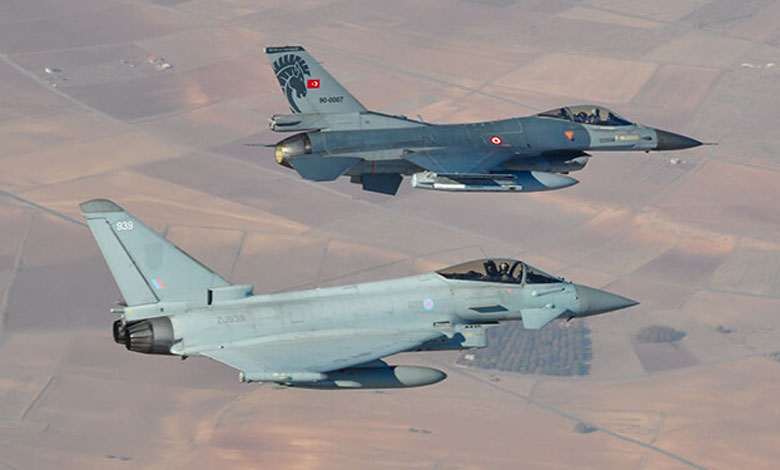

A Turkish Air Force F-16 aircraft is seen in joint flight with a British Air Force Eurofighter Thyphoon aircraft (foreground) during a military exercise. (Photo: Savunma Sanayii ST)
The spokesperson for the Ministry of National Defense (MND), Brig. Adm. Zeki Aktürk, announced that that a significant milestone has been achieved in the procurement of new F-16s from the United States.
Admiral Aktürk stated on February 29 that the Ministry has received the ‘Draft Proposal and Acceptance Letters’ from the United States, regarding Türkiye’s request to purchase 40 F-16 Block-70 (F-16V) F-16s from the United States, as well as a “modernization kit” to upgrade 79 of the existing F-16s to that level.
As a result, negotiations between the Turkish and US delegations on the delivery of the F-16 Viper or F-16V aircraft and the accompanying military equipment and weapons could commence.
On the other hand, Ministry sources confirm that the purchase of Eurofighter Thyphoon fighters was also on the agenda during Defense Minister Yaşar Güler’s meeting with British Defense Minister Grant Shapps in London on February 27.
So, why is Türkiye still pushing for the purchase of Eurofighters now that the F-16s are on their way out and Kaan, the National Combat Aircraft (MCA), has made its first flight?
There are three main answers to this question.
Eurofighter issue: Diversity, transition period
1- Transition period: The earliest the MMU Kaan can join the Turkish Air Force fleet is expected to be 2032. This depends on Türkiye’s plan to switch to domestic production of the Kaan engine in 2028. In two years’ time, new and existing F-16s will barely cover the deficit. In this transition period, the Turkish Armed Forces do not want to leave any vulnerabilities in its air defense strategy, which is based on the assumption that the F-35s will arrive, taking into account the growing political tensions in the open region. On the other hand, the Turkish Armed Forces do not want to face new S-400 problems with non-NATO aircraft, such as the Su-35 or Su-57 that Russia wants to sell.
2- Diversity: While the military wants to work with NATO-compatible weapon systems, it also wants to get rid of its dependence on the US. This is not a new problem; it dates back to the late 1980s. As early as the Turgut Özal era, the option of buying 80 fighter jets from Europe to replace the first batch of 160 F-16s manufactured in Türkiye was under consideration, but diplomatic pressure led to the decision on F-16s.
And the US Congress
3- US Congress: Türkiye does not want to deal with pressure from lobbies in the US Congress again. Similar problems exist in European countries as well. For example, while the UK, Spain and Italy, as the joint producers of the Eurofighter Typhoon fighter, have no problem with the sale to Türkiye, Germany is still unable to give its approval.
The reason Güler discussed the issue with his British counterpart is that he believes the UK can convince Germany. The issue was also raised during British Foreign Secretary David Cameron’s visit to Foreign Minister Hakan Fidan on January 26, the very day the US State Department approved the sale of the F-16Vs.
Fidan also recently met with German Foreign Minister Annalena Baerbock twice, three days apart, during the Munich Security Conference and the G20 meetings in Rio. However, it has not yet been announced whether the Eurofighter issue was discussed during these meetings, which reportedly focused on Gaza.
Current status on F-16s
Türkiye is expected to pay $23 billion (713 billion Turkish Lira at current exchange rates) for this purchase, as previously announced. However, defense sources say the exact pricing will be determined during negotiations. One of the reasons for this is that Türkiye wants the $1.4 billion down payment it paid for the F-35 fighters, which the United States had removed Türkiye because of its purchase of S-400 missiles from Russia, to be allocated to the purchase of F-16Vs.


